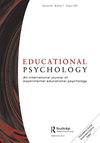儿童在无计时和定时算法计算任务中的表现:执行功能、数学考试焦虑和基本数学事实流利性的作用
IF 3
2区 心理学
Q1 EDUCATION & EDUCATIONAL RESEARCH
引用次数: 0
摘要
摘要本研究探讨了执行功能技能和数学考试焦虑是否与儿童的无计时和定时算法计算表现及其差异有关。它还调查了这种关系是否受到儿童基本数学事实流利性的调节。130名三年级学生被老师根据他们的执行功能技能进行了评分。此外,他们还自我报告了自己的数学考试焦虑水平,并接受了各种数学技能的测试。结果表明,对于不计时的计算成绩,工作记忆在基础数学事实流利度低的儿童中是相关的,而数学考试焦虑在所有儿童中都是相关的。无论基本数学事实的流利程度如何,计划/组织和数学考试焦虑都与定时计算成绩相关。至于这两种情况下计算能力的差异,数学考试焦虑与基础数学事实流利度低的儿童有关。讨论了如何促进儿童算法计算的意义。本文章由计算机程序翻译,如有差异,请以英文原文为准。
Children’s performance on untimed and timed algorithmic computation tasks: the roles of executive functioning, maths test anxiety and basic maths fact fluency
Abstract This study explored whether executive functioning skills and maths test anxiety were associated with children’s untimed and timed algorithmic computational performance and their discrepancy. It also investigated whether such relations were moderated by children’s basic maths fact fluency. One hundred and thirty third-graders were rated by teachers regarding their executive functioning skills. Moreover, they self-reported their maths test anxiety level and were tested on various maths skills. Results showed that for untimed computational performance, working memory was a correlate among children low in basic maths fact fluency, whereas maths test anxiety was a correlate among all children. Planning/organization and maths test anxiety were correlates of timed computational performance, regardless of the basic maths fact fluency level. As for discrepancy in computational performance across the two conditions, maths test anxiety was a correlate among children low in basic maths fact fluency. Implications on how to promote children’s algorithmic computation were discussed.
求助全文
通过发布文献求助,成功后即可免费获取论文全文。
去求助
来源期刊

Educational Psychology
Multiple-
CiteScore
6.40
自引率
6.20%
发文量
57
期刊介绍:
This journal provides an international forum for the discussion and rapid dissemination of research findings in psychology relevant to education. The journal places particular emphasis on the publishing of papers reporting applied research based on experimental and behavioural studies. Reviews of relevant areas of literature also appear from time to time. The aim of the journal is to be a primary source for articles dealing with the psychological aspects of education ranging from pre-school to tertiary provision and the education of children with special needs. The prompt publication of high-quality articles is the journal"s first priority. All contributions are submitted "blind" to at least two independent referees before acceptance for publication.
 求助内容:
求助内容: 应助结果提醒方式:
应助结果提醒方式:


